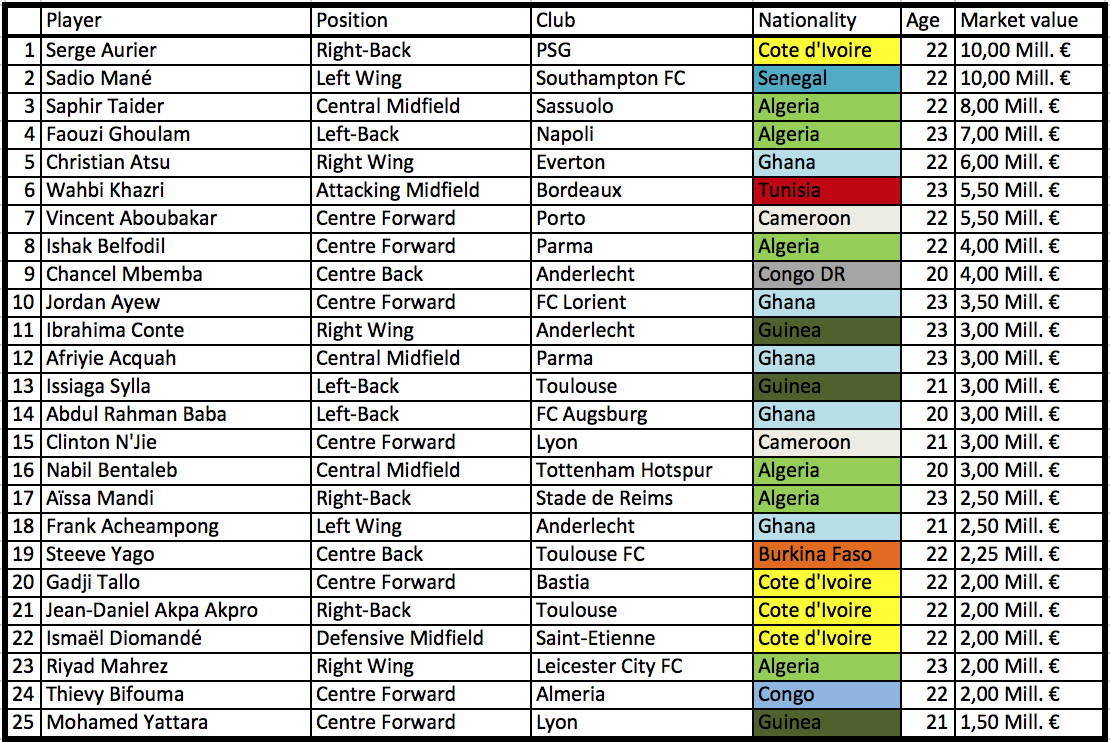Having won a Serie A and Coppa Italia domestic double, Juventus is still on track to complete the treble when the club faces FC Barcelona on June 6th in Berlin. Irrespective of how the Champions' League Final matchup unfolds, Juve has already achieved a significant milestone by reaching the Champions' League Final; a milestone to which the likes of PSG and Manchester City have not come close having spent significantly more money than the Bianconeri over the past few seasons.
While it's easy to talk about the luck Juventus has had along the way in being drawn against Monaco and Dortmund (as opposed to tougher opponents), I'd rather highlight some of the transfer market strategies off the pitch that have helped the club excel on it. In an era of massive spending and UEFA Financial Fair-play, in addition to being the only team in Italy with its own stadium, Juventus has shown that through a combination of shrewd scouting, Bosman (free-transfer) signings and prudent spending, you can build a team capable of competing at the highest level of European competition. While the following strategies don't entirely explain Juve's success, they certainly explain a significant portion of it.
Bosman Signings:
Taking advantage of the free-agency rules in place following the Bosman ruling, the Old Lady has been able to make a number of impressive transfers on a free, including the likes of Kingsley Coman, Andrea Pirlo, Paul Pogba and Fernando Llorente. These players have provided a significant contribution to the Old Lady's successful season, and when you consider the potential re-sale value of players such as Llorente and Pogba, the return on investment in these players for Juve could be tremendous.
Prudent Signings:
Through a unique ability to consistently find value in the transfer market, Juve has been able to sign great players at a bargain such as Barzagli (€0.3M Euros from Wolfsburg), Lichtsteiner (€10M Euros from Lazio), Asamoah (€9M Euros to end co-ownership with Udinese), Arturo Vidal (€10.5M from Bayer Leverkusen) and Evra (£1.5M from Manchester United). When the club has decided to spend bigger sums of money, it has tended to do so on young outstanding talent with major re-sale value who will provide significant ROI over time, one way or another. Alvaro Morata (€20M from Real Madrid) is an example of this, having scored in both legs of the Champions' League semi-final against Madrid. Yet, Los Blancos have an option to take back the Spanish forward for €30M in 2016 or 2017.
Mature Signings:
Regardless of whether signings qualify as Bosman or prudent, Juve is able to sign players at an age where they are undervalued by the market yet the club is convinced (often correctly) they can be worth more to the Bianconeri. Pirlo, Barzagli and Evra fall into this category of Juventus signings. Due to their age alone, the value of these three players on the transfer market is a small fraction of that of say Kroos, Varane and Marcelo respectively, yet their contribution on the pitch is much more comparable. Even in the case of signing established stars such as Carlos Tevez (signed for a paltry £12M from Manchester City), the Turin club is able to take advantage of unique market opportunities to sign players at a significant discount to their true value.
Italian Core:
For better or for worse, Juventus, like many Italian teams that've enjoyed European success, is anchored by a solid Italian core of defenders. Buffon, Chiellini, Bonucci, and Barzagli provide assurances at the back similar to those provided by the likes of Baresi, Maldini, Costacurta and Tassotti in Sacchi's Milan team in the 90's. This foundation allows the more creative players to concentrate on their jobs knowing that they are well-protected at the back.
These are some of the reasons Juventus has been able to dominate in Italy while reaching the champions League final despite having a significantly smaller average player value (APV) than every team that made the final 8 with the exception of Monaco and Porto (see APVs below). Juve's APV is also significantly lower than teams that didn't make the final 8 such as Chelsea ( €21.12M APV), Manchester City (€18.18M APV) and Arsenal (€14.95M APV). In addition, the Old Lady already has future stars on her books such as Daniele Rugani (One of Italy's most promising young defenders), while Palermo's impressive young Argentine forward Paulo Dybala has been signed for a reported €40M. In the event that Juve decides to sell Paul Pogba for an astronomical figure this summer (or next), Giuseppe Marotta, Fabio Paratici and team will be ready to continue to close the deals required to strengthen the squad going forward.
Average Player Value (APV) of last 8 teams in 2014/2015 Champions' League (transfer values from transfermarkt.com
Through a unique ability to consistently find value in the transfer market, Juve has been able to sign great players at a bargain such as Barzagli (€0.3M Euros from Wolfsburg), Lichtsteiner (€10M Euros from Lazio), Asamoah (€9M Euros to end co-ownership with Udinese), Arturo Vidal (€10.5M from Bayer Leverkusen) and Evra (£1.5M from Manchester United). When the club has decided to spend bigger sums of money, it has tended to do so on young outstanding talent with major re-sale value who will provide significant ROI over time, one way or another. Alvaro Morata (€20M from Real Madrid) is an example of this, having scored in both legs of the Champions' League semi-final against Madrid. Yet, Los Blancos have an option to take back the Spanish forward for €30M in 2016 or 2017.
Mature Signings:
Regardless of whether signings qualify as Bosman or prudent, Juve is able to sign players at an age where they are undervalued by the market yet the club is convinced (often correctly) they can be worth more to the Bianconeri. Pirlo, Barzagli and Evra fall into this category of Juventus signings. Due to their age alone, the value of these three players on the transfer market is a small fraction of that of say Kroos, Varane and Marcelo respectively, yet their contribution on the pitch is much more comparable. Even in the case of signing established stars such as Carlos Tevez (signed for a paltry £12M from Manchester City), the Turin club is able to take advantage of unique market opportunities to sign players at a significant discount to their true value.
Italian Core:
For better or for worse, Juventus, like many Italian teams that've enjoyed European success, is anchored by a solid Italian core of defenders. Buffon, Chiellini, Bonucci, and Barzagli provide assurances at the back similar to those provided by the likes of Baresi, Maldini, Costacurta and Tassotti in Sacchi's Milan team in the 90's. This foundation allows the more creative players to concentrate on their jobs knowing that they are well-protected at the back.
These are some of the reasons Juventus has been able to dominate in Italy while reaching the champions League final despite having a significantly smaller average player value (APV) than every team that made the final 8 with the exception of Monaco and Porto (see APVs below). Juve's APV is also significantly lower than teams that didn't make the final 8 such as Chelsea ( €21.12M APV), Manchester City (€18.18M APV) and Arsenal (€14.95M APV). In addition, the Old Lady already has future stars on her books such as Daniele Rugani (One of Italy's most promising young defenders), while Palermo's impressive young Argentine forward Paulo Dybala has been signed for a reported €40M. In the event that Juve decides to sell Paul Pogba for an astronomical figure this summer (or next), Giuseppe Marotta, Fabio Paratici and team will be ready to continue to close the deals required to strengthen the squad going forward.
Average Player Value (APV) of last 8 teams in 2014/2015 Champions' League (transfer values from transfermarkt.com





























